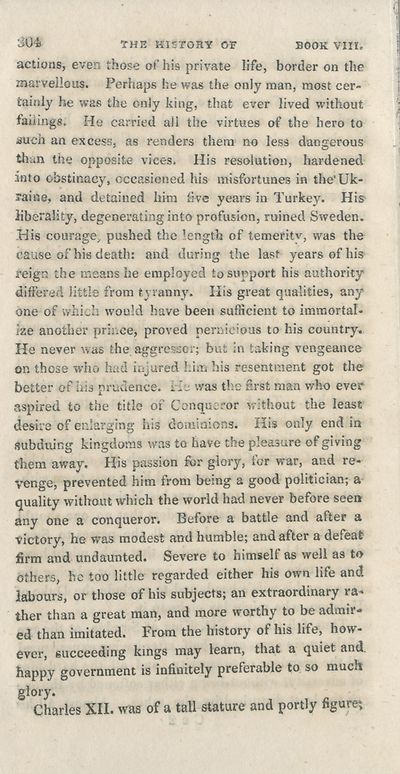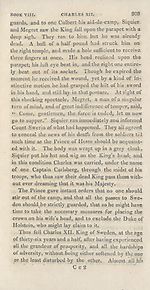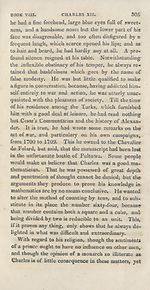Download files
Complete book:
Individual page:
Thumbnail gallery: Grid view | List view

THE HISTORY OF
BOOK vm.
30*
actions, even those of his private life, border on the
marvellous. Perhaps he was the only man, most cer¬
tainly he was the only king, that ever lived without
failings. He carried all the virtues of the hero to
such an excess, as renders them no less dangerous
than the opposite vices. His resolution, hardened
into obstinacy, occasioned his misfortunes in the'Uk¬
raine, and detained him live years in Turkey. His
liberality, degenerating into profusion, ruined Sweden.
His courage, pushed the length of temerity, was the
cause of his death: and during the last years of his
reign the means he employed to support his authority
differed little from tyranny. His great qualities, any
one of which would have been sufficient to immortal¬
ize another prince, proved pernicious to his country.
He never was the aggressor; but in taking vengeance
on those who had injured him his resentment got the
better of his prudence, i- j was the first man who ever
aspired to the title of Conqueror without the least
desire of enlarging his dominions. His only end in
Subduing kingdoms was to have the pleasure of giving
them away. His passion for glory, for war, and re¬
venge, prevented him from being a good politician; a
quality without which the world had never before seen
any one a conqueror. Before a battle and after a
Victory, he was modest and humble; and after a defeat
firm and undaunted. Severe to himself as well as to
others, he too little regarded either his own life and
labours, or those of his subjects; an extraordinary ra¬
ther than a great man, and more worthy to be admir¬
ed than imitated. From the history of his life, how¬
ever, succeeding kings may learn, that a quiet and.
happy government is infinitely preferable to so much
glory.
Charles XII. was of a tall stature and portly figure*.
BOOK vm.
30*
actions, even those of his private life, border on the
marvellous. Perhaps he was the only man, most cer¬
tainly he was the only king, that ever lived without
failings. He carried all the virtues of the hero to
such an excess, as renders them no less dangerous
than the opposite vices. His resolution, hardened
into obstinacy, occasioned his misfortunes in the'Uk¬
raine, and detained him live years in Turkey. His
liberality, degenerating into profusion, ruined Sweden.
His courage, pushed the length of temerity, was the
cause of his death: and during the last years of his
reign the means he employed to support his authority
differed little from tyranny. His great qualities, any
one of which would have been sufficient to immortal¬
ize another prince, proved pernicious to his country.
He never was the aggressor; but in taking vengeance
on those who had injured him his resentment got the
better of his prudence, i- j was the first man who ever
aspired to the title of Conqueror without the least
desire of enlarging his dominions. His only end in
Subduing kingdoms was to have the pleasure of giving
them away. His passion for glory, for war, and re¬
venge, prevented him from being a good politician; a
quality without which the world had never before seen
any one a conqueror. Before a battle and after a
Victory, he was modest and humble; and after a defeat
firm and undaunted. Severe to himself as well as to
others, he too little regarded either his own life and
labours, or those of his subjects; an extraordinary ra¬
ther than a great man, and more worthy to be admir¬
ed than imitated. From the history of his life, how¬
ever, succeeding kings may learn, that a quiet and.
happy government is infinitely preferable to so much
glory.
Charles XII. was of a tall stature and portly figure*.
Set display mode to:
![]() Universal Viewer |
Universal Viewer | ![]() Mirador |
Large image | Transcription
Mirador |
Large image | Transcription
| Antiquarian books of Scotland > Kings & rulers > History of Charles XII, King of Sweden > (322) |
|---|
| Permanent URL | https://digital.nls.uk/115024874 |
|---|
| Description | Thousands of printed books from the Antiquarian Books of Scotland collection which dates from 1641 to the 1980s. The collection consists of 14,800 books which were published in Scotland or have a Scottish connection, e.g. through the author, printer or owner. Subjects covered include sport, education, diseases, adventure, occupations, Jacobites, politics and religion. Among the 29 languages represented are English, Gaelic, Italian, French, Russian and Swedish. |
|---|

